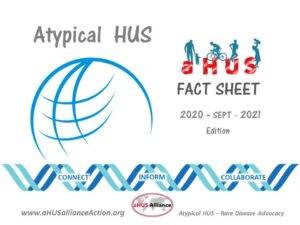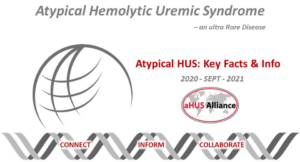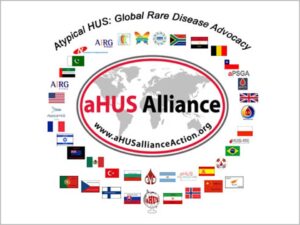Article No. 377
16 September 2020

Atypical HUS: Key Facts & Info
Atypical Hemolytic Uremic Syndrome – an ultra Rare Disease
2019 – SEPT – 2020
What’s new in the past year for information related to the ultra rare disease atypical HUS (atypical hemolytic uremic syndrome)? Quite a bit, but it’s quite challenging to sort through the many different categorizations and wide variety of terms to find current and accurate information about aHUS. For the past few years, the aHUS Alliance Global Action team has created and released an ‘aHUS Fact Sheet’ with a snapshot of what’s important to aHUS families all over the world. We should know, as our international team of volunteers is composed of adult patients, caregivers, and aHUS family members. Our group amplifies global patient voices as we interact and collaborate within the atypical HUS space with clinicians, academics, research teams, and industry professionals.
2020 – Sept -2021
Atypical HUS Fact Sheet – Print & Share
aHUS Key Facts & Info, 2020-Sept-2021 pdf
(One double-sided pdf, Click Link Abov)
SCROLL Box Below – READ IT NOW
Other aHUS Print & Share pdfs
Available in 3 languages: EN FR SP
aHUS Tracker: Article with pdf (or pdf only)
aHUS Snapshots of Interest – What’s New? Since our last Edition, released aHUS Awareness Day 2019
Global aHUS Advocate Newsletter – Stay connected & gain insight with news and articles of high interest in the international aHUS community. Click HERE to learn more about this free resource, direct to your inbox from the aHUS Alliance Global Action team.

Ravulizumab for aHUS
Oct 2019: Ravulizumab (ALXN1210) was approved by the USFDA as the 2nd therapeutic drug to treat atypical HUS.
Alexion Press Release and aHUS Alliance article (on its FDA approval)
Spotlight on Ravulizumab: aHUS Alliance Series (5 parts): Dosing, Specific Patient Populations, Developments, Side Effects, Affordable? Article Oct 2020 aHUS Patient Voices: Ravulizumab
COVID-19
It’s no surprise that issues related to this year’s COVID-19 pandemic of 2020 figure as a central concern for the global medical community and for individuals alike. People with family medical histories that include atypical HUS have long been careful about reducing bacterial and viral loads through frequent hand-washing, reducing exposure in crowded environments, and taking extra precautions to stay well. Now the tide has turned so that the general public shares our concern about how to stem communicable diseases, and more people are alert to shielding themselves and others from COVID-19. People are beginning to ‘get it’, and thus may have a better understanding of challenges faced by someone living with a rare disease like aHUS. This in turn may have a positive impact on the spread of seasonal influenza this winter, as citizens around the world take care to limit exposure and which may indirectly all who suffer from a chronic disease or underlying medical condition.
About COVID-19: In 2003 the SARS (Severe Acute Respiratory Syndrome or SARS-CoV) outbreak affected an estimated 26 nations, and launched study into coronaviruses as well as into possible vaccines (source: WHO). COVID-19 like SARS or MERS is a disease caused by a form of coronavirus, a previously unknown virus known as SARS-CoV-2 which causes the disease COVID-19 (“Co” refers to corona, “vi” to virus, “d” to disease, and “19” for 2019).
aHUS & COVID-19: Webinar, Video & Assets (March 2020)
COVID-19 & Mental Health aHUS Alliance article (April 2020)
COVID-19 Challenges Faced by Dialysis Patients aHUS Alliance article (April 2020)
Reflections on aHUS During a Pandemic aHUS Alliance article (May 2020)
FMI: See our aHUS Alliance aHUS & COVID Resource Page
New for 2020 is the global clinical and research focus on thrombotic microangiopathy and complement, which have gained attention due to COVID-19 but are key medical aspects of atypical HUS. How do these areas intersect, and what do they mean for aHUS patients and the patients who treat them?
Atypical HUS: At the Intersection of COVID-19, Thrombotic Microangiopathy & Complement Research
aHUS & Thrombotic Microangiopathy (TMA)
Put simply, new information learned about COVID-19 has provided a wealth of information which is relative to aHUS research. Atypical HUS occurs when an over-activation of part of the body’s immune system ramps up (the complement system, one of three pathways). Part of that process is for the lining of the body’s small blood vessels to shear apart its red blood cells as they pass, causing tiny clots to form. These tiny clots (or thrombi) cause damage to small blood vessels inside vital organs such as the kidney, lungs and brain (microangiopathy in Latin = “small blood vessel problem”). For people with COVID-19, damage to lung function due to thrombotic microangiopathy (or TMA) causes many patients to need a ventilator for breathing difficulties, particularly with severe cases or for people who had other health issues or were elderly. As doctors worked long hours to save patients with severe COVID-19 symptoms which affected the heart, lungs, and other major organs, researchers and clinical care teams collaborated to better understand TMA development and to work toward lessening its severity.
TMA activity occurs in a variety of medical conditions, to include aHUS, so new information about thrombotic microangiopathy can help advance aHUS research and drug discovery. As of 1 Sept 2020, there are 372 clinical trials listed for ‘thrombotic microangiopathy’ with 32 of those 372 clinical trials encompassing both atypical HUS and TMA.
Thrombotic Microangiopathy & Precision Medicine aHUS Alliance article (May 2020)
aHUS or TMA Syndromes Consensus aHUS Alliance article (Feb 2020)
aHUS – Is its End Really Nigh? aHUS Alliance article (Dec 2019)
For more Original Content on this topic, use our website’s Search Bar
Click below to visit our
aHUS Research & Publications Page
Scroll through the New aHUS Research list & for its research section for Thrombotic Microangiopathy (TMA)
Atypical HUS & Complement
For people with atypical HUS, disease activity can be caused by bacterial or viral infection (as well as triggered by pregnancy, certain drugs, and more) to activate their immune response into hyperdrive (amplifying into a complement cascade), which results in fewer red blood cells and a drop in platelet counts as these tiny clots form to clog and interfere with normal organ function.
Currently there are two approved complement inhibitors, eculizumab and ravulizumab (Soliris® and Ultomiris® both products of Alexion Pharmaceuticals), which block atypical HUS activity, preventing over-activation of the immune system process which causes damage throughout the body and to major organs such as the kidneys, brain, and other vital organs. Many COVID-19 research teams are interested in the role the complement system plays, and drug candidates which might inhibit this overactivation. Atypical HUS is often called ‘complement-mediated thrombotic microangiopathy’ (CM-TMA), and can be described as having dysregulation of the alternative pathway (AP) of the complement system. While complement-mediated diseases present very differently, and mutations in DGKE aren’t associated with activation of the complement pathway (Quaggin, 2013), there are 161 clinical trials listed for complement which may lead to new knowledge about potential aHUS therapeutic drugs.
Complement-Mediated TMA: Did you Know that it’s aHUS? aHUS Alliance article (Sept 2020)
The aHUS Diagnosis Challenge aHUS Alliance article (Sept 2020)
2019: More Questions than Answers aHUS Alliance article (Dec 2019)
For more Original Content on this topic, use our website’s Search Bar
Click below to visit our
aHUS Research & Publications Page
Scroll through the New aHUS Research list & for its research section for Complement
aHUS Treatment & Care
Delays in treatment, or misdiagnosis, continue to have devastating impact on atypical HUS patient outcomes. Accurate and early diagnosis can help prevent catastrophic aHUS events such as stroke or seizures, cardiac events, or kidney failure. Atypical Hemolytic Uremic Syndrome usually damages the kidneys (hence the “uremic”) and can cause kidney failure, resulting in a need for dialysis. Rather than a life dictated by dialysis restrictions and comorbidities, aHUS patient quality of life is much improved by kidney transplantation – but research shows that renal transplants can be destroyed by aHUS activity attacking the new kidney unless eculizumab is available to prevent aHUS recurrence. Treatment for aHUS can be complex, involving a multi-disciplinary approach for issues involving the heart, lungs, brain, or other body systems.
aHUS Diagnosis: Time is of the Essence aHUS Alliance article (July 2020)
Cardiorenal Syndrome: the Relationship between Kidney & Heart Health aHUS Alliance article (May 2020)
That aHUS Transplant Question aHUS Alliance article (March 2020)
For more Original Content on these topics, use our website’s Search Bar
Click below to visit our
aHUS Research & Publications Page
Scroll through the New aHUS Research list & for its research sections for Diagnosis, Treatment & Extra-Renal: Effects on the Body
aHUS: Access & Opportunities to Move Forward
While it’s encouraging that ravulizumab (Ultomiris®) was approved late last year for atypical HUS patients in the USA, other countries must in 2020 review its access within their own national drug and rare disease policies. Cost drives treatment access, especially for rare diseases with small populations whose therapeutic drugs come with a high per patient expenditure.
What’s new in 2020 for potential drugs in development? Has there been progress made with drug types, dosage, or optimal duration of treatment? What’s holding back aHUS clinical trials? What can patients, physicians, and industry do to form strong, inclusive collaborations to advance aHUS care options for all nations?
There are many questions about aHUS genetics and knowledge gaps about the disease itself, as well as questions related to research topics of importance to aHUS families and patient organizations around the world. Your support of aHUS patients, issues, and aHUS is both appreciated and needed for international advocacy to have a firm foundation resting on scientific methodology, and backed by patient engagement. We encourage you to stay connected to aHUS news and keep informed with our aHUS Global Advocate Newsletter.
Access to Eculizumab aHUS Alliance article (Sept 2020)
aHUS Health, Well-Being, and Work aHUS Alliance article (July 2020)
2020 aHUS Therapeutic Drug Overview aHUS Alliance article (June 2020)
USA aHUS Patients: Are there 2000 or more, and Rising? aHUS Alliance article (July 2020)
Again, Just How Many aHUS Patients are there? aHUS Alliance article (Aug 2020)
aHUS Genetics: the Basics aHUS Alliance article (Feb 2020)
What about aHUS? aHUS Alliance article (June 2020)
For more Original Content on these topics, use our website’s Search Bar
Click below to visit our
aHUS Research & Publications Page
Scroll through the New aHUS Research list & for its research sections for Drug Research/Discovery, Genetics, Summary Articles & Literature Reviews

Atypical HUS: Key Facts & Info for 2020-2021
SCROLL to READ
or Print & Share this Document by Clicking the Link Below
aHUS Key Facts & Info, 2020-Sept-2021 pdf
CITATIONS Section: Listed at the end of this article

We Recognize & Deeply Thank
aHUS Alliance Action Team – An International Collaboration
We thank those who collaborate on global aHUS research efforts, and extend our gratitude to the physicians and groups who partner with patient organizations and international aHUS advocacy efforts.
and sincerely appreciate
aHUS Advocates & Patient Organizations around the World
United in Advocacy to raise Visibility & make a Difference
for care and concerns of people with atypical Hemolytic Uremic Syndrome
NEW for 2020 Atypical HUS Info Center

Easy Access to aHUS Research, Info, Videos, and MORE
aHUS Awareness & Rare Disease Day
Atypical HUS: Key Facts & Info
2020 – Sept – 2021
CITATIONS Section
1 Genetics Home Reference, NIH. Atypical hemolytic-uremic syndrome.
2 Noris M, Caprioli J,Bresin E, et al. Relative Role of Genetic Complement Abnormalities in Sporadic and Familial aHUS and Their Impact on Clinical Phenotype. Clin J Am Soc Nephrol. 2010;5:1844-1859.
3 Benz K and Amann K. Thrombotic microangiopathy: new insights. Curr Opin Nephrol Hypertens.2010;19(3):242-247.
4 Tsai HM. The molecular biology of thrombotic microangiopathy. Kidney Int 2006 Jul;70(1):16-23.
5 Noris M and Remuzzi G. Review Article: Atypical Hemolytic–Uremic Syndrome. N Engl J Med 1212 2009;361:1676-87.
6 Caprioli J, Noris M, Brioschi S, et al. Genetics of HUS: the impact of MCP, CFH, and IF mutations on clinical presentation, response to treatment, and outcome. Blood. 2006 ;108: 1267-1279.
7 Kavanagh D and Goodship T. Atypical Hemolytic Uremic Syndrome, Genetic Basis, and Clinical Manifestations. Acquired Hematopoietic Disorders: Complement-Mediated Blood Disorders. 2011:15-20.
8 Frémeaux-Bacchi, V. Treatment of atypical uraemic syndrome in the era of eculizumab. Clin Kidney J. 2012;5:4–6.
9 Bresin E, Daina E, Noris M, et al. Outcome of renal transplantation in patients with non–Shiga toxin-associated hemolytic uremic syndrome: prognostic significance of genetic background. Clin J Am Soc Nephrol. 2006;1:88-99.
10 aHUS Action. Atypical Haemolytic Uremic Syndrome (aHUS). Accessed March 6, 2013. Available at: http://www.ahus-action.org/wp-content/uploads/2011/10/aHUS-Action-Briefing-for-Parliamentarians-FINAL.pdf .
11 Burke L, Kayler J, Biermann C. The Atypical HUS Foundation (USA). A Parent’s Perspective -aHUS Bootcamp. April, 2013.
12 Loirat C, Frémeaux-Bacchi V. Atypical hemolytic uremic syndrome. Orphanet J Rare Dis. 2011 Sep 8; 6:60.
13 Tschumi S, Gugger M, Bucher B, Riedl M, Simonetti G. Eculizumab in atypical hemolytic uremic syndrome: long-term clinical course and histological findings. Pediatric Nephrology. November 2011;26(11):2085-2088.
14 Mache C, Acham-Roschitz B, Frémeaux-Bacchi V, et al. Complement Inhibitor Eculizumab in Atypical Hemolytic Uremic Syndrome. Clin J Am Soc Nephrol. 2009; 4:1312–1316.
15 Loirat C, Garnier A, Sellier-Leclerc AL, Kwon T. Plasmatherapy in atypical hemolytic uremic syndrome. Semin Thromb Hemost 2010:36(6):673-681.
16 Zuber J, Fakhouri F, Roumenina LT, Loirat C, Frémeaux-Bacchi V on behalf of the French Study Group for aHUS/C3G. Use of eculizumab for atypical haemolytic uraemic syndrome and C3 glomerulopathies. Nat Rev Nephrol 2012:8:643-657.
17 National Health Service. Dialysis – Side Effects. NHS Choices.
18 Nester CM, Barbour T, Rodriquez de Cordoba S, Dragon-Durey MA, Fremeaux-Bacchi V, Goodship THJ, Kavanagh D, Noris M, Pickering M, Sanchez-Corral P, Skerka C, Zipfel P, Smith RJH. Atypical aHUS: state of the art. Mole Immunol 2015 Apr 3 ; 67(1):31-42, 2015.
19 Fakhouri F, Frémeaux-Bacchi V, Loirat C. Atypical hemolytic uremic syndrome: From the rediscovery of complement to targeted therapy. European Journal of Internal Medicine 2013:24:492-495.
20 Legendre C, Babu S, Furman R, et al. Safety and Efficacy of Eculizumab in aHUS Patients Resistant to Plasma Therapy: Interim Analysis from a Phase 2 Trial. Abstract presented at the 43rd annual meeting of the American Society of Nephrology, Denver, CO, USA, 16–21 November 2010.
21 Muus P, Legendre C, Douglas K et al. Safety and Efficacy of Eculizumab in aHUS Patients Resistant to Plasma Therapy: Interim Analysis of a Phase 2 Trial. Abstract presented at the 43 rd annual mtg. of the American Society of Nephrology, Denver, CO, USA, 16-21 November 2010.
22 Legendre C.M., Licht, Muus P et al. Terminal Complement Inhibitor Eculizumab in Atypical hemolytic-Uremic Syndrome. N Engl J Med 2013;368:2169-81.
23 Kim J, Waller S and Reid C. Clinical Report: Eculizumab in atypical haemolytic-uraemic syndrome allows cessation of plasma exchange and dialysis. Clin Kidney J. 2012,0:-3.
24 24 Kim Maga, TK, Nishimura CJ, Weaver, AE, Frees KL, Smith RJ. Mutations in alternative pathway complement proteins in American patients with atypical hemolytic uremic syndrome. Available at: http://www.ncbi.nlm.nih.gov/pubmed/20513133
25 Nester CM, Smith RJH. Factors influencing treatment of atypical hemolytic uremic syndrome. Clin J Am Soc Nephrol 2014 Aug 18 [Epub ahead of print]; 9(9):1516-8, 2014.
26 28 June 2015, aHUS Alliance mtg. of international aHUS patient organizations. London.
27 Risitano, Antonio. The Future of Complement Treatment. At the European Society for Blood and Marrow Transplantation, Sept 29-Oct.1, 2014. Naples, Slide 4. Naples.
28 2016 aHUS Global Poll. Conducted by the aHUS Alliance, 45 questions for aHUS adult patients and pediatric caregivers, polled in 6 languages. (N=233, from 23 countries) Poll Overview:http://ow.ly/gSj8303GcdH Poll Questions & Results: http://ow.ly/1DA7303FoJx
29 Hofer J et al. Extra-Renal Manifestations of Complement-Mediated Thrombotic Microangiopathies. Front Pediatr. 2014; 2: 97.

CONTACT US at
info@aHUSallianceAction.org

